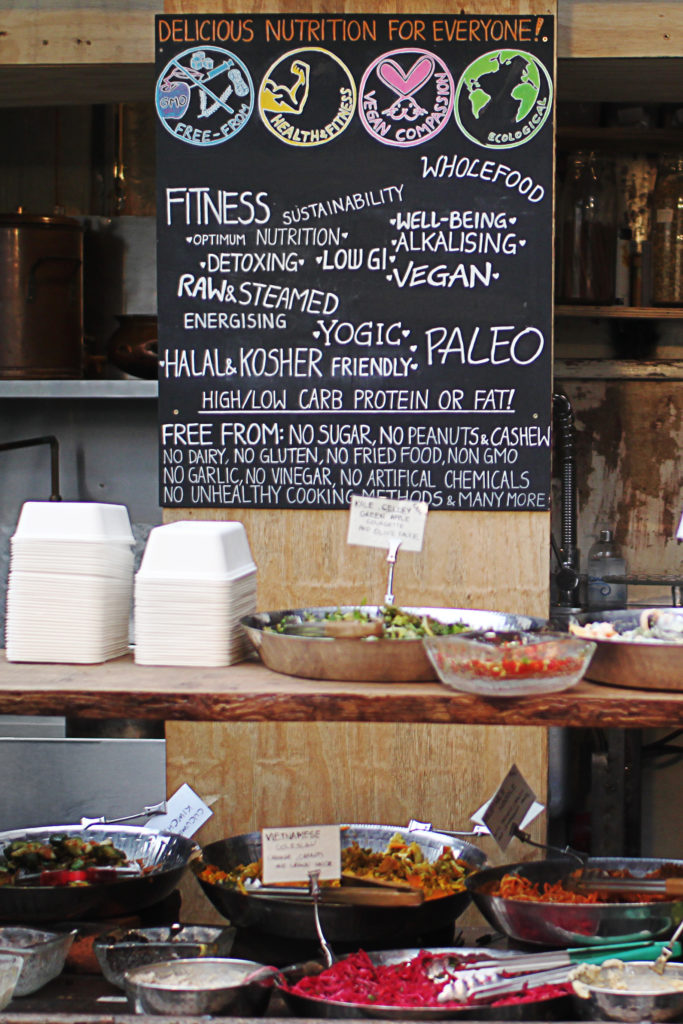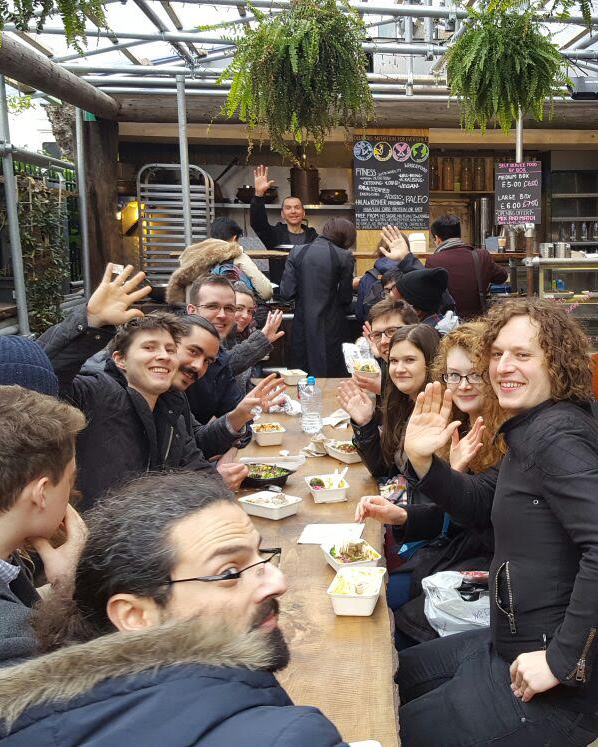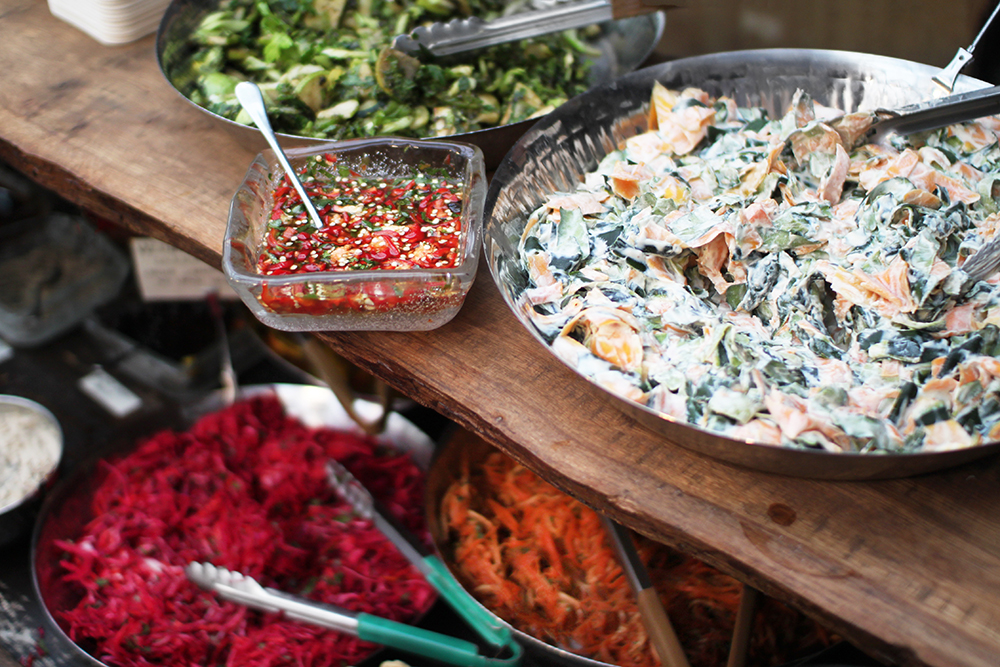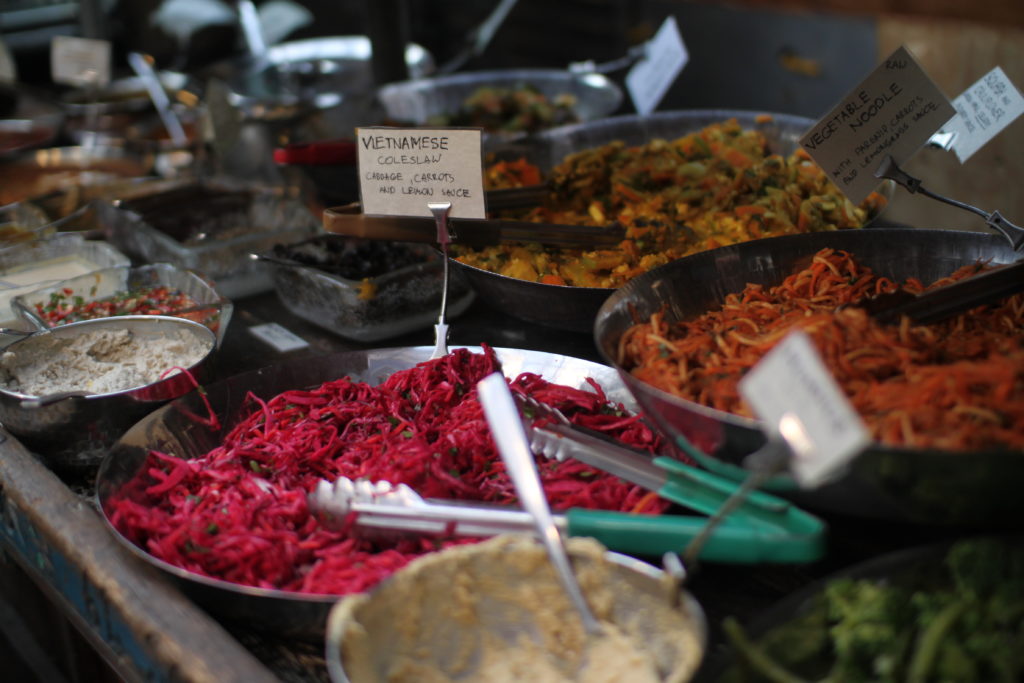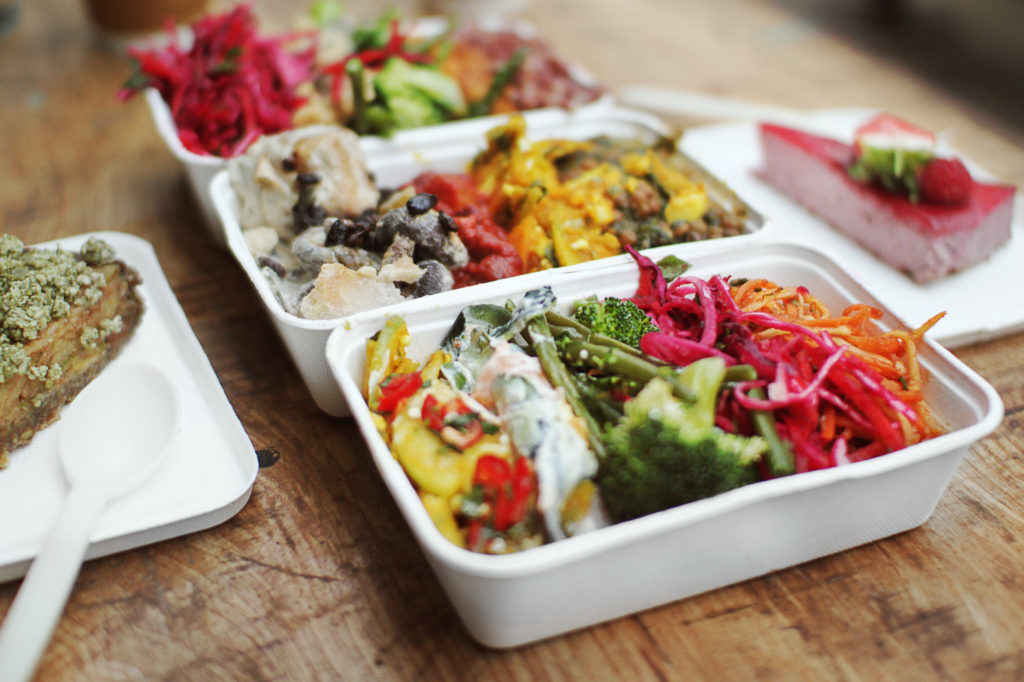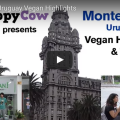Very near the center of the city, 100 yards down the road after taking a left out of Goodge Street Station, lies some of the healthiest food in London. Vantra Eden’s fare, its sign proclaims, contains “No Dairy, No Gluten, No Sugar, No Fried Food, Non GMO, No Peanuts & Cashew, No Garlic, No Vinegar, No Artificial Chemicals, No Unhealthy Cooking Methods – Vegan, Raw & Steamed, Halal & Kosher Friendly, Detoxing, Energising”.
“No garlic?” I ask Phun, Vantra’s owner. “Makes people too horny. They can’t meditate,” he laughs in reply. Of course, there are bowls of garlic and chilis to add at the end of the buffet should you have other appetites planned for the rest of your day.
Vantra Eden is first in the community of food tents at 79a Tottenham Court Road, across the street from Habitat.
They’re open Monday-Friday from 12-3 PM, a buffet “with lunch boxes, juices, cakes, & more”. A medium box is £6, while a large is only £7.50. Very reasonably priced. And the food is amazing. With the dishes either raw or steamed, the buffet selection offers the deliciously creamy ‘Vegan Stroganoff’ (Shiitaki Mushrooms, Celery, Mustard, Parsnips, Rosemary and Herbs), incredibly flavorful ‘Thai Curry’ (Carrots, Courgette, Cabbage, Coconut, Lemongrass Sauce), the heartier ‘Rice Noodles with Seaweed, Parsley, and Cabbage’, as well as ‘Potato with Curry Spice’, ‘Squash, Green Apple, Celery, Courgette, Cauliflower in Curry Sauce’, ‘Vegetable Noodles with Parsnips, Carrots, and Lemongrass Sauce’, ‘Coleslaw’ (Red and White Cabbage with Carrots and Sunflower Seed Sauce), ‘Vegetable Biryani Rice’ (Rice, Carrot, Cabbage, Chili), ‘Steamed Broccoli with Olive Oil’, ‘Lentil Dahl with Cumin and Sun dried Salt’, ‘Mashed Potato’ (White and Sweet Potato with Mustard Seeds), and ‘Moussaka with Chickpea, Celery, Aubergine, Tomato Sauce’. The soup on offer today is ‘Chickpea, Potato, Cabbage, Salt, Black Pepper’ and there’s also Kombucha, juices, and smoothies.
Eden is the sister martketplace to the Vantra restaurant that until very recently was located on Oxford Street. (Vantra Loungetivity has now opened at 5 Wardour Street in Central London). Don’t worry, they haven’t closed, they’re simply moving. Keep your eyes peeled for their new address. For the past 18 years owner Phun has been delivering his vision of the ideal food for human consumption at restaurants around the capital city. Various incarnations of Vantra (or Vitao or Vantra Vitao) were seen on Finchley Road, Wardour Street, and Soho Street. Along with the buffet, the restaurant provided a full menu and a range of Mylkshakes, ‘Super Juices’, ‘Sexy Smoothies’, Coffees & Teas. The hot chocolate was divine. My personal favorite dish was the ‘Mixed Seed Crackers with Sunflower & Pumpkin Seed Cheese’. Ingredients listed as ‘flax seed, sunflower seed, pumpkin seed, squash, non-chili spices, lemon and lime juice, nutritional yeast, tomato, sea salt, black pepper, garlic, and onion’. Nutritious and delicious.
Phun tells me that vegan food is on the rise in London but he’s suspect about the new fad. “Vegan, yes, but people still want the burgers and sweet potato fries. Fried stuff, just like the meat it’s substituting that needs to be cooked and have flavor added to it. I’ve always emphasized the natural taste of vegetables. Why argue with Mother Nature?”
Phun was kind enough to sit down with me and answer some questions about his philosophy of life and food. He is passionate about his beliefs but never preachy, laughing a lot during our conversation. This is his mission and he performs it with true generosity (we spoke for almost two hours).
What does the name Vantra mean? Where does it come from?
Phun: We used to have two restaurants, one called Vantra one called Vitao. Vitao was the original. ‘Vi’ is life, merged with ‘Tao’. Tao is very hard to define in words. It’s so big, we cannot describe it. It’s so big, we cannot see how big it is. Or it’s so small, we can’t see it. Tao is when life is in harmony, in balance. What is balance, what is harmony? When life is in its natural state, a healthy state. Our mission is to maintain the Tao. To make a natural balance, in the way we eat and the way we live. Organic, ethical. It’s related to life and living, so we have a lot of raw food, a lot of live food, organic, healthy, back to nature. The paleo philosophy may think that humans were eating meat in the past. I call it philosophy because it’s only an idea. The Tao goes beyond human history, it’s common sense. Why is it common sense? If someone has been starving for two weeks and you show them a mango and a cow and offer them a choice, they will be drawn to the mango by its fragrance and shape. The mango fits naturally in your hand, you can hold it. It has natural beauty, not the human perception of beauty. Beauty is what attracts you to be one with the thing, the golden ratio that attracts one to the other. It’s the same with food. It’s beyond instinct, it’s intuition, synchronized with nature. Instinct is reacting, intuition is understanding. How did they kill cows before humans had weapons? It doesn’t make sense. The paleo diet is correct when they say a million years ago, humans were more healthy. This is true. But it’s not because of eating meat. It’s because the meals were organic, the air was pure, and there wasn’t as much stress in life. With Vitao, we have to think back to common sense, nature, and the way it was before, intuitively. That’s why we opened the restaurant. I became vegan 28 years ago and 18 years ago I decided to share my knowledge and my know-how and opened Vitao restaurant.
After Vitao had been going for about eight years, it was getting very busy so we decided to open a new restaurant but we struggled to find a name to suit what we’re doing – the Tao, the balance, life. We were thinking about ‘tantra’, making it more sexy, ‘mantra’, having the vibrations, ‘yantra’, all kinds of words, and we just couldn’t get it. So at last we just kept quiet and didn’t try too hard. And then the word ‘vantra’ came up. It’s a mixture of all these things. It was a new restaurant, a big restaurant, and we wanted to create a new culture. Holding events, being social, having fine dining and vegan culture. We wanted something that would represent that. Tantra, mantra, veganism, so with a ‘V’.
Veganism for you is not just about what we eat but how this extends to our environment and our climate.
P: Of course! Because number one, being vegan is not about what you eat, it’s how and why you eat. Those are more important than what you eat. Like with driving, to be safe on the road, it’s not about what car you drive, or what road you drive. If you get drunk, if you don’t behave, even if you have the best car, you still may very well crash. You may have a map or GPS (laughs), and you keep on looking at the GPS and you get confused, it’s not about that. The most important thing is the driver. Veganism is not about just what you eat. Why you eat, who are you while eating, who you are, what is your being. Are you being compassionate or are you just thinking about compassion? When you’re being compassionate then you become conscious. If you’re thinking and eating your vegan food and an insect catches your eye, if you’re very conscious, before the insect bites you, you should move. So if you can be so conscious and compassionate not to kill the insect, you move your hand. And you become so alert and compassionate, and so conscious, it won’t touch you. The more you have compassion for others, like Jesus said, ‘thou who gives shall be given’ But to me, people take this for granted now. All the marketing is about giving now. It never was before, but now it’s free upgrades. They know if they give you something, you will buy something back. But that’s not true giving. That is selling. Giving with expectation, making more money from you. So I say ‘thou shall truly give to truly receive’.
Where are you from, before you came to London?
P: Malaysia. Plenty of sunshine and healthy food. Our basic diet is more plant-based. Some meat, a little fish. 70-80% vegan diet, but that’s the Asian way of eating. I came to London 30 years ago. I was eating a meat diet, healthy meat, healthy fish, grass-fed cow. When I come to London it was the 80s with Mad Cow Disease. I felt good in the beginning but it came to a point where my whole body just broke down – rash, tiredness, getting cold a lot. So I looked into something different and adopted an alternate lifestyle, and diet as well.
Who designs the menu?
P: I do. I also designed the interior design of the restaurant. It’s all aligned together, with our mission, our beliefs. All has to be natural, ethical. Our chairs were like tree trunks, sitting down, with a straight back. Emphasizing sitting upright rather than leaning back. Very earthy energy. Hardly any plastic here.
You mention on the website that you were the first in the UK to do a lot of these things.
P: Yes, years ago. Even now, I don’t know of anyone as strong as us. There are raw food restaurants but I think we’re the only ones to not use wheat. Even the raw places use agave and cashew nuts. The only nuts we use are macadamias, almonds, and Brazil nuts. The rest is hemp seeds and pumpkin seeds. We don’t use a lot of protein, so that’s why some people think it’s not as heavy as other raw restaurants. A lot of raw food relies too much on protein. Nutrition-wise we are very thoughtful of this. We were the first raw food restaurant in this country. We have cooked food too, but steam-based. No frying or baking, and no sugar. And there’s nowhere else in this country that does it like this. We offer very good paleo options here. We use sprouted chickpeas and lentils. The Paleo diet has some sense, because everything is about being natural. We only have one or two things with grains. If the paleo is eating meat that is not the best. Meat is naturally carcinogenic to humans. Meat is acidic, it has a lot of toxins, it’s difficult to digest.
Tell me more about why you’re trying to keep protein low.
P: Look at a tiger. They eat high protein, their energy fields come from protein and fat. But look at their stomach, it’s different from ours. Even so, those things are difficult to digest. Look at the tiger, the crocodile, the snake, after eating meat what do they do? They sleep. They take a few weeks to digest. Meat-eating animals have very strong stomach acid. They have a round stomach that can break down bones. But humans don’t have that. We have long intestines, designed to eat vegetables. We don’t emphasis high protein here, even vegan protein like nuts and seeds. Because we are not squirrels. A squirrel has so much gas.
What’s wrong with cashew nuts?
P: Nothing wrong with cashew nuts as long as you don’t eat too much. The problem is the way humans harvest them – quickly, quickly, quickly, and pile them up. Peanuts as well. They both have a lot of moisture. And when they pile them up, what will happen? They will grow mold. Peanuts have more than 20 carcinogenic microtoxins in them. So when there’s a lot of mold, it’s more acidic, and then it’s toxic. It’s all common sense. When I first eating raw food, I ate a lot of cashew nuts, got addicted. I got too heavy, and got a rash. Then I researched, and found out they are full of mold and microtoxins, I should’ve listened to myself (laughs). It’s all about wisdom, understanding, listening to the body. Forget theory, listen to the body. The body knows. Listen to the heart, not the animal instinct.
So we don’t want too many nuts. Our system isn’t powerful enough to break down the protein and the fat. That’s why we should eat more fresh vegetables. And with vegetables you can see if it’s healthy or not. If a leaf is not healthy, you can see it’s yellow. If a fruit is not healthy, you can see a lot of little black dots. We can’t see that with nuts, they could be rancid.
Where do you get your ingredients from?
P: We get them from different cooperative, organic, ethical companies like Natural and Suma, British ethical wholesalers. We support more ethical eco companies to grow. Our disposables – straws, cups, takeaway boxes – are all biodegradable. It costs us more but it’s about being moral. Not just about ourselves and profit. It’s not just about yourself, it’s about the whole big picture. So when we don’t fry our food, we’re not wasting oil. We’re not wasting anything here. If we juice, we use the pulp in something else. For almond milk we use the pulp for biscuits or a base for other things. Nothing is wasted. Of course some things we have to cut, but then we compost it, it goes back to nature. And with not using oil utensils don’t become greasy and sticky so we don’t have to use a lot of washing-up liquid and waste more. It’s all about harmony. Cause and effect.
Tell me about some of the dishes you’ve come up with – the Thai Curry?
P: Thai chickpea curry. Traditionally they had reasons for all the spices and herbs that go in Thai curry. They’re medicinal. In the old days there were no antibiotics. There were a lot of things like turmeric. That’s why curry has turmeric. Different spices were used to promote digestion. We only use chickpeas if they’re sprouted. Makes them easy to digest. We don’t use other beans which are too hard to digest. Lentils too are easy to digest. Mainly our emphasis is on vegetables. And we don’t overcook them. You see all nice and green. Salad, only the tender green leaves, easy to digest. Not so with carrots, beetroot, cabbage, and kale. Those should be semi-fermented, turn into kimchi, to be broken down by the enzymes and bacteria. Not just for digestion but also to have more probiotics for our immunity. That’s why most of our salad is fermented.
The Mixed Seed Crackers with Sunflower & Pumpkin Seed Cheese?
P: We use sunflower seeds for the cheese. When you talk about vegans and protein, people say ‘oh vegan diet, you need to eat this, you need to eat that’…well, sunflower seeds have the full set of amino acids, complete. Just now we were talking about nuts and seeds being difficult to digest. These sunflower seeds are fermented. So you have probiotics and they’re broken down by the bacteria and enzymes so it’s easy to digest. And with the flax seed, then you get the Omega-3. You get the protein. Sunflower seeds have monounsaturated (fat) oils so you have a mixture of all these oils. It’s not just about low protein. We make sure you have enough good fat. And they’re easy to digest. We use good quality flax seeds, not over-dehydrated.
Any final words for our readers?
P: Promote more veganism. It’s important for the world. Not just ecologically, but for our well-being. It’s very important to be compassionate, because humans have a choice to be more conscious. We can be more conscious in order to save the world. Because the world is declining and it will come to the point of no return. So we better do this while we have the chance. Promoting veganism promotes consciousness, compassion, and true health. As humans, we all have different responsibilities. I hope your message will inspire people.
About the author: Aug Stone lives in Los Angeles. He writes words and music, sometimes together. His work can be found at http://www.augstone.com/. Find him on Facebook as “Aug Stone”, on Twitter as “augstone”, and on Instagram as “overexposedaerialphotaugrapher

